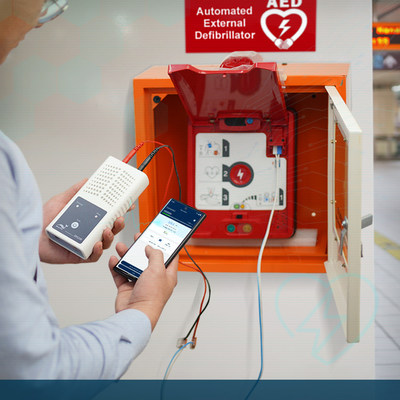WhaleTeq: Widespread as AEDs Are, Have These Life-Saving Machines Really Come in Handy?

TAIPEI, June 24, 2022 /PRNewswire/ — Unlike most products, AEDs sit idle most of the time. However, a life-or-death situation follows when it’s being used. The consequences can be tragic if an AED isn’t properly maintained. WhaleTeq, a professional medical device test solution provider proposed a simple but accurate way to conduct AED maintenance check – DFS200, an AED Field Tester.
Every year, sudden cardiac death takes the lives of 7 million people around the world, accounting for about 40% of the total death toll, seriously threatening people’s lives and health.
AED, an automated external defibrillator, regarded as a “life-saving machine”, is undoubtedly the savior of cardiac arrest patients. It can automatically determine whether the patient needs electric shock and help the patient to restore the normal rhythm and contraction of the heart. Besides, AEDs are designed for use by laypersons with very little training because of its easy operation.
AED Failures Heard from Time to Time, A Life-Or-Death Situation No One Can Afford to Ignore
AED has the characteristics of simple operation and can be used by anyone, but people ignore that AED is not a panacea. Malfunction may occur, and making mistakes in judgment is not out of expectation. There have been many cases of patients dying due to AED failures in the user anomalies reported by the US FDA and IEEE.
According to FDA data in 2015, between 2005 and September 2014, a total of 72,000 users reported abnormality, and at least 750 deaths may have been caused by AED failures. FDA has thus announced that AED manufacturers should comply with stricter going-to-market rules since that year. (PMA, Premarket Approval).
IEEE’s previous data further pointed out that from 2005 to 2009, there were 28,000 abnormal reports, equivalent to 1 failure out of every 50 reports. Among them, 17 of the most serious conditions included diagnostic errors, incorrect instructions, and unnecessary shocks, but the deadliest problem was no power supply after pressing the shock.
In Japan, 2014 is the tenth anniversary of the Japanese government’s opening to the public for free use of AEDs. NHK TV produced a special report program, pointing out that there were 103 serious problems of AED failures in the past 9 years, of which 42 cases were incapable of saving their lives. Worse cases include inability to shock and dead batteries.
The Risk of AED Being out of Warranty- Losing the Chances to Save Lives
When a critical situation occurs, it is almost impossible to save lives because of AED failures, which is a situation that everyone is not happy with. Like other electrical appliances, AEDs may also have problems with failure and longevity. Although AED brands vary, the warranty period is usually five to eight years. With the premise that most AEDs have been set up without regular maintenance, its availability is indeed a concern.
In general, after AED has passed the warranty date, the manufacturers are no longer responsible for providing aftercare and maintenance, and the law doesn’t punish those who fail to fulfill their management responsibilities. Outdated AEDs are either discarded or left idle in the corner, becoming “AED orphans”.
If people can conduct AED maintenance check regularly, replacing its disposable parts in a timely manner, the efficiency and effectiveness of AED can be ensured, which also improves life-saving success rate.
Maintenance Check on a Regular Basis Increases Life-Saving Possibilities
However, what many people don’t know is that the AED self-test cannot detect all possible failures. Even AEDs do have automated self-tests, but if no one is actively maintaining the device and able to respond to a failed self-test, this feature is obsolete.
Specifically, an AED self-test can only confirm its MCU and firmware status but numbers like defibrillation energy, waveform and remaining power of battery are excluded. In addition, abnormal problems such as inability to shock, insufficient energy, charging for too long, and power overconsumption derived from aging parts are not able to be known through self-test.
For AED managers, self-test does provide a simple way to confirm AEDs’ availability, but people also need a way that can provide more detailed and complete information. For example, people need the engineer to test on-site, including defibrillation energy and waveform, battery voltage and upload data of each AED device to the cloud database, completely recording its maintenance check history.
DFS200, an AED Field Tester launched at the Right Time
In the light of this, WhaleTeq launched DFS200. Engineers can easily test every function mentioned in the previous paragraph through AED field tester DFS200, including AED defibrillation energy and waveform, lithium battery voltage, and generate a variety of ECG waveforms for AED to determine whether defibrillation is required.
At the same time, this AED field tester DFS200 can be used in pairs with management platform, pointing out parts that might not be functional according to the big data. It helps users not only to save time, but also to improve the quality of it. The management platform can also set a maintenance check notification, disposable parts changing reminder, and automatically assign them to the engineers, thereby saving more manpower and time for AED managers.
More info: https://reurl.cc/Xjy8e7
About WhaleTeq Co. Ltd
Founded in September 2013, WhaleTeq provides first-class test solutions, including test equipment and associated services for medical devices. We strive to assist our clients in launching their top-quality medical devices to the market in the most efficient way. Our specialty lies in physiologic monitoring systems testing, such as ECG, EEG, PPG, SpO2, respiration monitor testing. We are honored to work with renowned medical device providers such as GE, Philips, Siemens, Medtronic, as well as international laboratories such as UL, SGS, TUV and CSA.
View original content to download multimedia:https://www.prnewswire.com/news-releases/whaleteq-widespread-as-aeds-are-have-these-life-saving-machines-really-come-in-handy-301573639.html
SOURCE WhaleTeq
